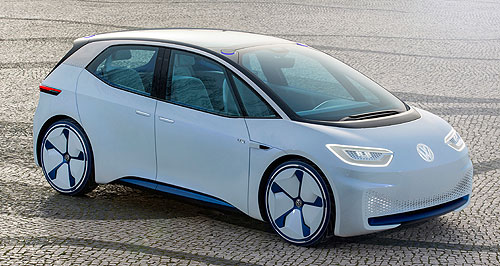News - VolkswagenVolkswagen steps up EV rolloutPlug in, turn on: Volkswagen has laid out its ambitions to launch almost 70 new electric models over the next 10 years across all its brands including Audi, Skoda and Porsche. Some 70 EVs set for the next 10 years as VW boosts efficiency and cuts emissions14 Mar 2019 VOLKSWAGEN has announced it will launch nearly 70 new electric models in the next 10 years – some 20 more than previously reported – taking the number of Volkswagen Group electric platforms from 15 million to 22 million units over that time.
Distributed within the Volkswagen Group brands that take in Volkswagen, Audi, Skoda, Seat, Porsche, Bentley and Bugatti, the move will cut the collective carbon dioxide footprint within that timeframe by 30 per cent.
Volkswagen AG CEO Dr Herbert Diess also told journalists in Germany that up to 40 per cent of VW Group volume will be EVs by the end of the next decade.
Most of the electric models across the Volkswagen Group will employ the MEB modular electric architecture, with the Volkswagen ID leading the charge from a mainstream point of view in Australia from 2021 – though the more specialised Porsche Taycan and Audi e-tron will launch first to reel in Tesla’s lead.
Meanwhile, other models were also confirmed for future release include a new Volkswagen mid-size SUV, the Porsche Cayenne Coupe and a new-generation Audi A3 Sportback.
To support the EV onslaught, Volkswagen will also add 2000 extra jobs at its technical centre, but between 5000-7000 jobs will be cut elsewhere by 2023
Another goal is for Volkswagen to be fully carbon dioxide-neutral “from fleet to production to administration by 2050, as per the Paris climate accord targets”.
According to, the brand is changing to meet the needs and expectations of consumers moving forward. To that end, some $A50 billion will be spent on electrifying Volkswagen’s electric vehicle portfolio alone by 2023.
“Volkswagen is taking on responsibility with regard to the key trends of the future – particularly in connection with climate protection,” Mr Diess said.
“The targets of the Paris Agreement are our yardstick. We will be systematically aligning production and other stages in the value chain to CO2 neutrality in the coming years. That is how we will be making our contribution towards limiting global warming.
“In order to shoulder the investments needed for the electric offensive we must make further improvements in efficiency and performance in all areas.”
To help make efficiency improvements and achieve greater economies of scale within the electrification sphere, Volkswagen has said it will seek partners outside of the group such as the Ford Motor Company, who has already signed up to use technologies surround the MEB platform.
Meanwhile, earnings took a nose dive last year as the Volkswagen Group continued its heavy investment in electrification, as well as a hit from the changeover to the stringent new Worldwide Harmonised Light Vehicle Test Procedure (WLTP) protocols that have resulted in a 25 per cent cut in the number of models offered underneath the Volkswagen Group umbrella – with many of these being diesel. The so-called “diesel issue” (Dieselgate in Volkswagen-speak) cost the company more than $A3 billion in 2018.
Still, Volkswagen delivered a record number of new vehicles in 2018 globally, as did Porsche, Skoda and Seat.
Overall, Volkswagen Group delivered 10.83 million vehicles worldwide last year, with its biggest market being Asia Pacific (4,546,300) followed closely by Europe (4,380,700).
Volkswagen-branded passenger vehicles sales revenues grew by 6.8 per cent to $A135 billion on 6,244,900 global deliveries, of which Australia contributed 56,620 units.
“We performed very well in spite of strong headwinds,” Mr Diess said. “Our Group brands all worked very hard to help achieve this result.
“We must now redouble our efforts, step up the pace and resolutely continue the transformation we have begun.”
Looking forward, Volkswagen expects sales to improve slightly this year, even though economic challenges, exchange rate volatilities, increased competition and stricter WLTP requirements abound.
Sales revenues are predicted to rise by up to five per cent in 2019, while operating return on sales is thought to jump in the range of 6.5 to 7.5 per cent.  Read more7th of March 2019  Geneva show: VW goes retro again with ID BuggyVolkswagen expands electric vehicle family with dune-blasting ID Buggy concept6th of March 2019  Geneva show: Audi’s new Q4 e-tron lights upPre-production Q4 e-tron points towards new all-electric Audi SUV due in 202027th of February 2019  Porsche to go all-electric with MacanFossil fuel engines to be dumped by Porsche for its next Macan in 2021 |
Click to shareVolkswagen articlesResearch Volkswagen Motor industry news |
















Facebook Twitter Instagram